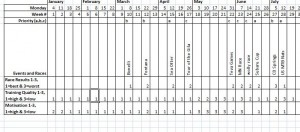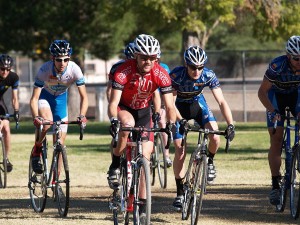Download your 2010 Post Season Review spreadsheet here: postseasonreview2010

2010 example
Article also published on MTBRaceNews.com: here
At the close of a long race season it is important to take a break that offers you a chance to decompress. A transition phase lasting a couple weeks will allow your body and mind a break from the demands of an intense season of training and racing. With the reduced workload and extra down time during this transition phase it’s a natural opportunity to reflect upon the season in attempt to better understand why things went the way they did. Fall singletrack rides are a great opportunity for such reflection, but I suggest taking your post season review one step further by putting pen to the paper (or fingers to the keyboard). There is certainly value in producing a tangible record of the year, something that you can use for future review. Making an honest assessment of what went well and what could have gone better is an excellent way to close out your season.
Completing a post season review will help you figure out more precisely ‘what it takes’ to achieve your goals. Considering the following factors in your post season review will help you to better make sense of how your season played out over the long term. Keep in mind that your performance on the bike is the chronic, cumulative effect of a myriad of factors – all of which affect your race results, training quality, and motivation.
Race Results
Considering your race results is perhaps the most obvious way to recap how well you were performing throughout the season. When during the year were you achieving your strongest results? Was there a period where your results seemed to exceed or perhaps fall short of your expectations? After taking note of your results, see if any trends might exist for early season, mid season, or late season. A strong result doesn’t necessarily mean a high placing alone, so be sure to consider the competition and greater context of your finishes. Reviewing your training log can help remind you of how well you were placing at various phases during the season.
Training Quality
It’s also important to consider the quality of your training throughout the year. Athletes will naturally have phases with high and low quality training. To a large degree it’s the consistency of your riding that affects its overall effectiveness. Training quality is high when you’re consistently doing strong rides, recovering well from them, and not skipping workouts on a regular basis. Trends here do not necessarily need to correlate with those found in your racing results; however high training quality will generally correlate with stronger race results. This can be especially true when you’re building towards a specific goal event. High quality training done over the long term ought to lead to steadily improving results in a positive feedback loop of sorts.
Motivation
Noting the extent of your motivation across the season will add a higher degree of value to your post season review. Prerequisite to mountain bike racing is a willingness to suffer and at various phases during the season our motivation will be varied. Considering when and why motivation was high or low will help you to better understand the trends found in your racing results and training quality. It is completely normal to have phases of low motivation during the season and recalling when those phases were will help you to identify the potential causes. Considering your degree of motivation can help you better understand why your race results or training quality was what it was, when it was. When were you highly motivated to train and really pumped up to race? Likewise, when was it tough to get through your workouts and what races could you have done without? Sometimes low motivation can help to explain lackluster results following periods of high training quality.
Making Sense of it All
Considering your race results, training quality and level of motivation over the timeline of a race season is an excellent way to complete a post season review. Chances are good that you’ll pick up on some new clues in regards to ‘what it takes’ while being reminded of several old clues too. Whenever you make plans for next season, referring to your post-season review will be a very helpful part of the process. Taking the time now will help next season’s plan to be smarter than any previous. Consider what got you the results, what had you training the most consistently, and what kept you motivated and willing to go for it. Riders who have ‘what it takes’ on race day are those who can best correlate their motivation, training quality, and ultimately their results with the races that mean the most to them. Every season of training and racing experience stands to be valuable, but only to the degree in which we apply what we’ve learned.



